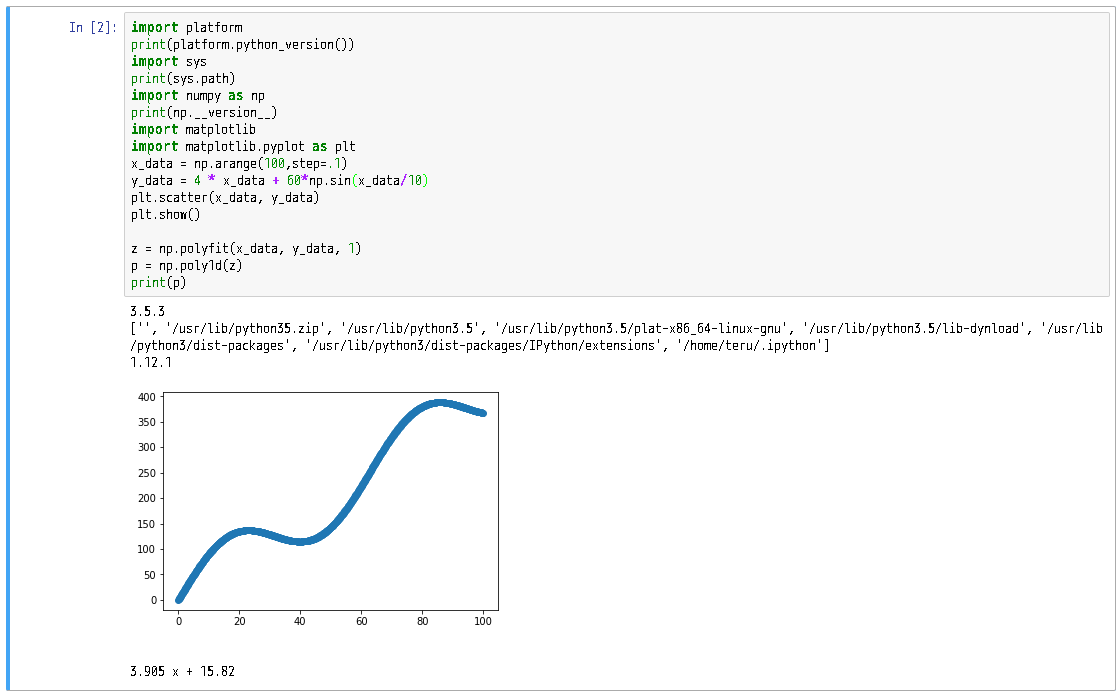
TensorFlowで回帰をやってみる例。もとネタはCS224d: TensorFlow Tutorialから。
最近であれば、どのLinuxディストリビューションでもパッケージシステムにpythonは基本入っているので、最新のを使わなければならないのでなければ、パッケージをつかえば良い。 Spyderを使っても良いが、操作性を考えるとJupyer Notebookが最も使いやすいと思われ、 Debianであれば、virtualenvを含めて下記あたりを入れれば良いだろう。ipythonが対話的シェルで、jupyterがWebサーバとなる。 python2は古いので、特段の事情がなければ、python3を使う。
python3-ipython - Enhanced interactive Python shell (Python 3 version)
python3-ipython-genutils - IPython vestigial utilities for Python 3
python3-jupyter-client - Jupyter protocol client APIs (Python 3)
python3-jupyter-console - Jupyter terminal client (Python 3)
python3-jupyter-core - Core common functionality of Jupyter projects for Python 3
virtualenv - Python virtual environment creator
virtualenvwrapper - extension to virtualenv for managing multiple virtual Python environments
virtualenv-clone - script for cloning a non-relocatable virtualenv
python3-virtualenv - Python virtual environment creator
TensorFlowは、whlパッケージ提供されており、そのままpipインストールすると/usr/localあたりかホームディレクトリに入るが、 更新等があるので、virtualenvでTensorFlow用のディレクトリをつくってそこに入れておくのがおすすであり、本家のドキュメントでも推奨されている。 --system-site-packagesをつけてディストリビューションのパッケージを使っても良いし、--no-site-packagesで新たにすべて入れても良い。
user@debian57:/opt$ virtualenv tensorflow-py3.5m -p /usr/bin/python3.5m
Running virtualenv with interpreter /usr/bin/python3.5m
Using base prefix '/usr'
New python executable in /opt/tensorflow-py3.5m/bin/python3.5m
Also creating executable in /opt/tensorflow-py3.5m/bin/python
Installing setuptools, pkg_resources, pip, wheel...done.
user@debian57:/opt$ . tensorflow-py3.5m/bin/activate
(tensorflow-py3.5m) user@debian57:/opt$ pip3 install /home/user/tmp/tensorflow-1.8.0-cp35-cp35m-linux_x86_64.whl
Processing /home/user/tmp/tensorflow-1.8.0-cp35-cp35m-linux_x86_64.whl
Collecting protobuf>=3.4.0 (from tensorflow==1.8.0)
Using cached https://files.pythonhosted.org/packages/5b/c3/9b947e301e19bea75dc8c1fd3710eed5d2b31aa13ae13d5e38e891f784cc/protobuf-3.5.2.post1-cp35-cp35m-manylinux1_x86_64.whl
Collecting grpcio>=1.8.6 (from tensorflow==1.8.0)
Using cached https://files.pythonhosted.org/packages/2c/ff/f118147fd7a8d2d441d15e1cb7fefb2c1981586e24ef3a7d8a742535b085/grpcio-1.12.0-cp35-cp35m-manylinux1_x86_64.whl
Collecting termcolor>=1.1.0 (from tensorflow==1.8.0)
Collecting numpy>=1.13.3 (from tensorflow==1.8.0)
Using cached https://files.pythonhosted.org/packages/7b/61/11b05cc37ccdaabad89f04dbdc2a02905cf6de6f9b05816dba843beed328/numpy-1.14.3-cp35-cp35m-manylinux1_x86_64.whl
Collecting astor>=0.6.0 (from tensorflow==1.8.0)
Using cached https://files.pythonhosted.org/packages/b2/91/cc9805f1ff7b49f620136b3a7ca26f6a1be2ed424606804b0fbcf499f712/astor-0.6.2-py2.py3-none-any.whl
Collecting gast>=0.2.0 (from tensorflow==1.8.0)
Requirement already satisfied: wheel>=0.26 in ./tensorflow-py3.5m/lib/python3.5/site-packages (from tensorflow==1.8.0) (0.31.1)
Collecting absl-py>=0.1.6 (from tensorflow==1.8.0)
Collecting tensorboard<1.9.0,>=1.8.0 (from tensorflow==1.8.0)
Using cached https://files.pythonhosted.org/packages/59/a6/0ae6092b7542cfedba6b2a1c9b8dceaf278238c39484f3ba03b03f07803c/tensorboard-1.8.0-py3-none-any.whl
Collecting six>=1.10.0 (from tensorflow==1.8.0)
Using cached https://files.pythonhosted.org/packages/67/4b/141a581104b1f6397bfa78ac9d43d8ad29a7ca43ea90a2d863fe3056e86a/six-1.11.0-py2.py3-none-any.whl
Requirement already satisfied: setuptools in ./tensorflow-py3.5m/lib/python3.5/site-packages (from protobuf>=3.4.0->tensorflow==1.8.0) (39.2.0)
Collecting markdown>=2.6.8 (from tensorboard<1.9.0,>=1.8.0->tensorflow==1.8.0)
Using cached https://files.pythonhosted.org/packages/6d/7d/488b90f470b96531a3f5788cf12a93332f543dbab13c423a5e7ce96a0493/Markdown-2.6.11-py2.py3-none-any.whl
Collecting bleach==1.5.0 (from tensorboard<1.9.0,>=1.8.0->tensorflow==1.8.0)
Using cached https://files.pythonhosted.org/packages/33/70/86c5fec937ea4964184d4d6c4f0b9551564f821e1c3575907639036d9b90/bleach-1.5.0-py2.py3-none-any.whl
Collecting html5lib==0.9999999 (from tensorboard<1.9.0,>=1.8.0->tensorflow==1.8.0)
Collecting werkzeug>=0.11.10 (from tensorboard<1.9.0,>=1.8.0->tensorflow==1.8.0)
Using cached https://files.pythonhosted.org/packages/20/c4/12e3e56473e52375aa29c4764e70d1b8f3efa6682bef8d0aae04fe335243/Werkzeug-0.14.1-py2.py3-none-any.whl
Installing collected packages: six, protobuf, grpcio, termcolor, numpy, astor, gast, absl-py, markdown, html5lib, bleach, werkzeug, tensorboard, tensorflow
Successfully installed absl-py-0.2.2 astor-0.6.2 bleach-1.5.0 gast-0.2.0 grpcio-1.12.0 html5lib-0.9999999 markdown-2.6.11 numpy-1.14.3 protobuf-3.5.2.post1 six-1.11.0 tensorboard-1.8.0 tensorflow-1.8.0 termcolor-1.1.0 werkzeug-0.14.1
virtualenv環境でインストールしたパッケージは、jupyter-notebookでは探すことができないので、起動後に別途sys.path.append()でsite-packagesの場所を追加するか、 virtualenv下にipythonを別途インストールした上でそこからipythonをkernelとしてインストールする必要がある。
(tensorflow-py3.5m) user@debian57:/opt$
(tensorflow-py3.5m) user@debian57:/opt$ pip3 install ipykernel
(tensorflow-py3.5m) user@debian57:/opt$ ipython3 kernel install --user --name=tensorflow-py3.5m
Installed kernelspec tensorflow-py3.5m in /home/user/.local/share/jupyter/kernels/tensorflow-py3.5m
(tensorflow-py3.5m) user@debian57:~/.local/share/jupyter/kernels$ cat /home/user/.local/share/jupyter/kernels/tensorflow-py3.5m/kernel.json
{
"argv": [
"/opt/tensorflow-py3.5m/bin/python3.5m",
"-m",
"ipykernel_launcher",
"-f",
"{connection_file}"
],
"language": "python",
"display_name": "tensorflow-py3.5m"
準備できたら、ルートにしたいディレクトリでjupyterを起動し、Webブラウザでファイルを開く。カーネルは上記ユーザの場所か/usr/share/jupyter/kernelsにインストールされているものが使える。
user@debian57:~/tmp/jupyter$ jupyter-notebook
[W 22:02:47.388 NotebookApp] Config option `token` not recognized by `NotebookApp`.
[W 22:02:47.658 NotebookApp] Widgets are unavailable. On Debian, notebook support for widgets is provided by the package jupyter-nbextension-jupyter-js-widgets
[I 22:02:47.676 NotebookApp] Serving notebooks from local directory: /home/user/tmp/jupyter
[I 22:02:47.676 NotebookApp] 0 active kernels
[I 22:02:47.677 NotebookApp] The Jupyter Notebook is running at: http://192.168.11.20:8888/
[I 22:02:47.677 NotebookApp] Use Control-C to stop this server and shut down all kernels (twice to skip confirmation).
バージョンを表示し、パスを表示してから、sinの加算された一次関数をnumpyで回帰分析してみる。
import platform
print(platform.python_version())
import sys
print(sys.path)
import numpy as np
print(np.__version__)
import matplotlib
import matplotlib.pyplot as plt
x_data = np.arange(100,step=.1)
y_data = 4 * x_data + 60*np.sin(x_data/10)
plt.scatter(x_data, y_data)
plt.show()
z = np.polyfit(x_data, y_data, 1)
p = np.poly1d(z)
print(p)

TensorFlowをインストールするだけのページによくあるHello Worldをやってから、回帰分析を最急降下法(Gradient descent)等で行う。 コマンドで*.pyを毎回実行するのであれば、変数の使いまわし等は気にしないでよいが、Jupyterなど対話的コンソールでは、 一回入力した後変数が保持されたままなので、TensorFlowの場合は、reuseを指定するか、毎回リセットする必要がある。
import sys
sys.path.append('/opt/tensorflow-py3.5m/lib/python3.5/site-packages')
import tensorflow as tf
hello = tf.constant('Hello, TensorFlow!')
sess = tf.Session()
print(sess.run(hello))
print(tf.get_variable_scope().reuse)
with tf.variable_scope(tf.get_variable_scope(), reuse=True):
print(tf.get_variable_scope().reuse)
print(tf.get_variable_scope().reuse)
n_samples = 1000
batch_size = 100
X_data = np.reshape(x_data, (n_samples,1))
Y_data = np.reshape(y_data, (n_samples,1))
# Reset tf to suppress following error:
# Variable linear-regression/weights already exists, disallowed.
# Did you mean to set reuse=True or reuse=tf.AUTO_REUSE in VarScope? Originally defined at:
tf.reset_default_graph()
X = tf.placeholder(tf.float32, shape=(batch_size,1))
Y = tf.placeholder(tf.float32, shape=(batch_size,1))
with tf.variable_scope("linear-regression", reuse=False):
W = tf.get_variable("weights", (1, 1),
initializer=tf.random_normal_initializer())
b = tf.get_variable("bias",(1,),
initializer=tf.constant_initializer(0.0))
y_pred = tf.matmul(X, W) + b
loss = tf.reduce_sum((Y - y_pred)**2/n_samples)
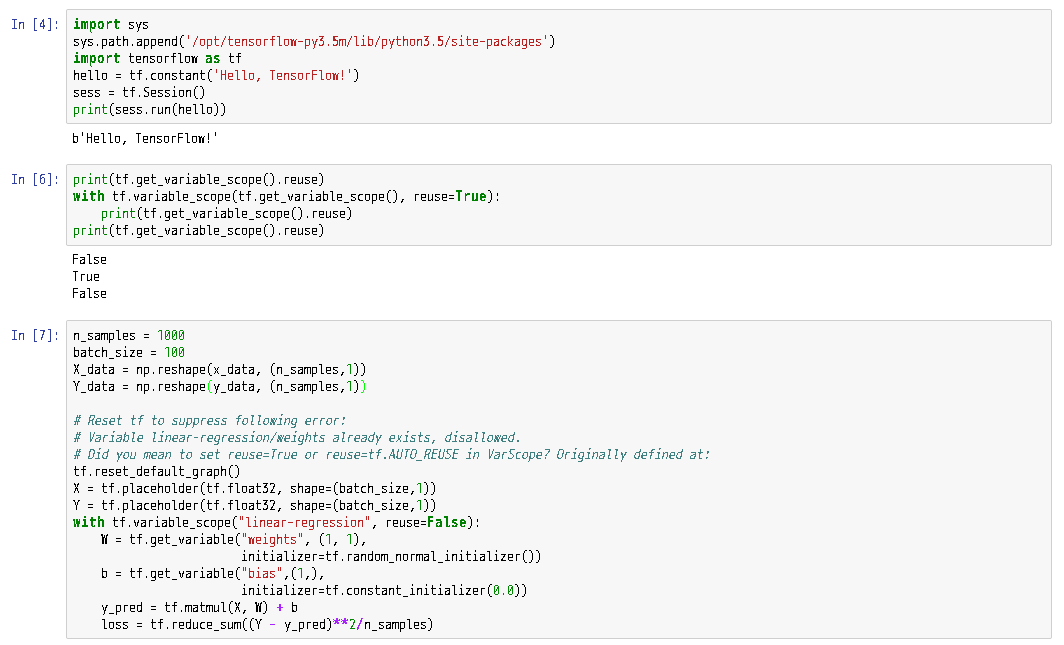
1-ステップ分の操作は以下のようになる。tf.global_variables_initializerを使うようにと警告が出ている。
# One step of gradient descent
opt =tf.train.AdamOptimizer()
opt_operation = opt.minimize(loss)
with tf.Session() as sess:
sess.run(tf.initialize_all_variables())
indices = np.random.choice(n_samples, batch_size)
sess.run([opt_operation], feed_dict = {X: X_data[indices], Y: Y_data[indices]})
print(sess.run(W))
print(sess.run(b))
plt.scatter(x_data, y_data)
plt.scatter(x_data, x_data*sess.run(W)+sess.run(b))
plt.show()
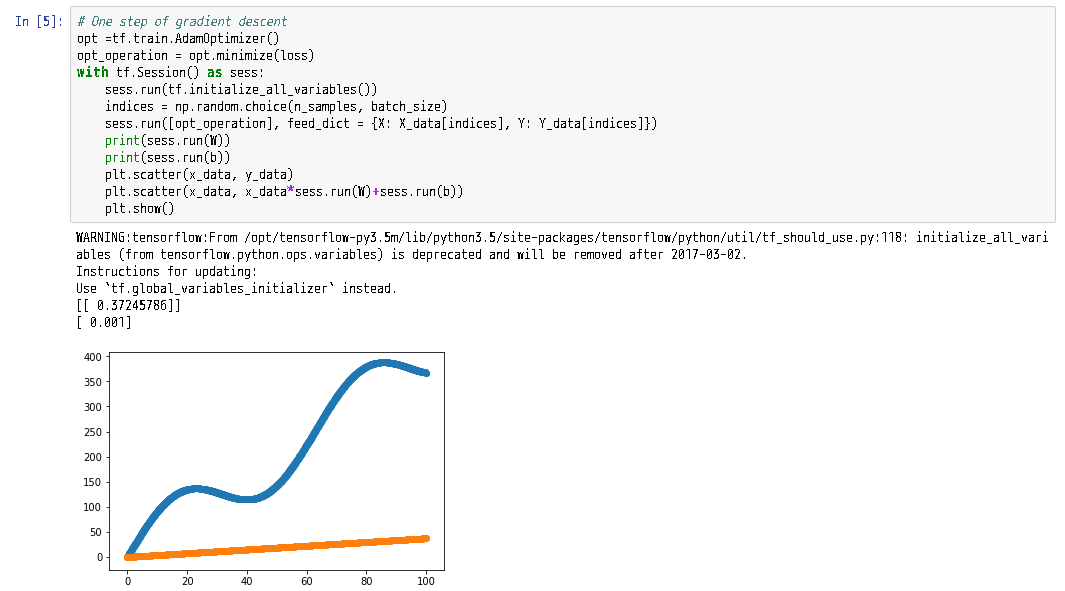
100回程度だと不十分。
opt_operation = tf.train.AdamOptimizer().minimize(loss)
count = 100
with tf.Session() as sess:
sess.run(tf.initialize_all_variables())
for _ in range(count):
indices = np.random.choice(n_samples, batch_size)
X_batch, Y_batch = X_data[indices], Y_data[indices]
_, loss_val = sess.run([opt_operation, loss], feed_dict={X:X_batch, Y:Y_batch})
print(sess.run(W))
print(sess.run(b))
plt.scatter(x_data, y_data)
plt.scatter(x_data, x_data*sess.run(W)+sess.run(b))
plt.show()
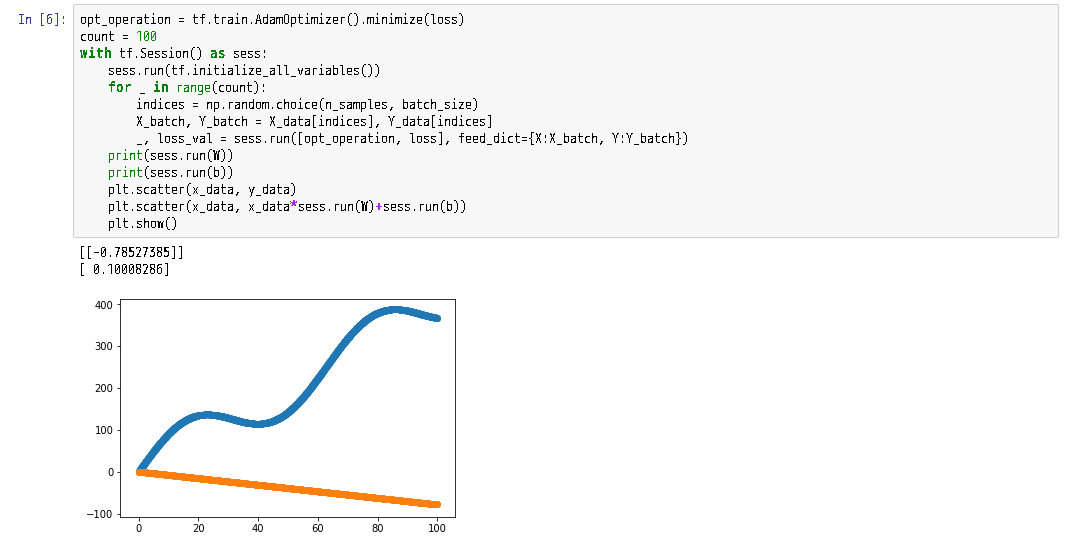
この例では、10000回でまあまの結果になる。
opt_operation = tf.train.AdamOptimizer().minimize(loss)
count = 10000
loss_ = np.zeros(count)
with tf.Session() as sess:
sess.run(tf.initialize_all_variables())
for _ in range(count):
indices = np.random.choice(n_samples, batch_size)
X_batch, Y_batch = X_data[indices], Y_data[indices]
step = _
_, loss_val = sess.run([opt_operation, loss], feed_dict={X:X_batch, Y:Y_batch})
loss_[step] = loss_val
print(sess.run(W))
print(sess.run(b))
plt.scatter(x_data, y_data)
plt.scatter(x_data, x_data*sess.run(W)+sess.run(b))
plt.show()
plt.figure(figsize=(12,4))
plt.scatter(np.arange(count,step=1), loss_)
plt.show()
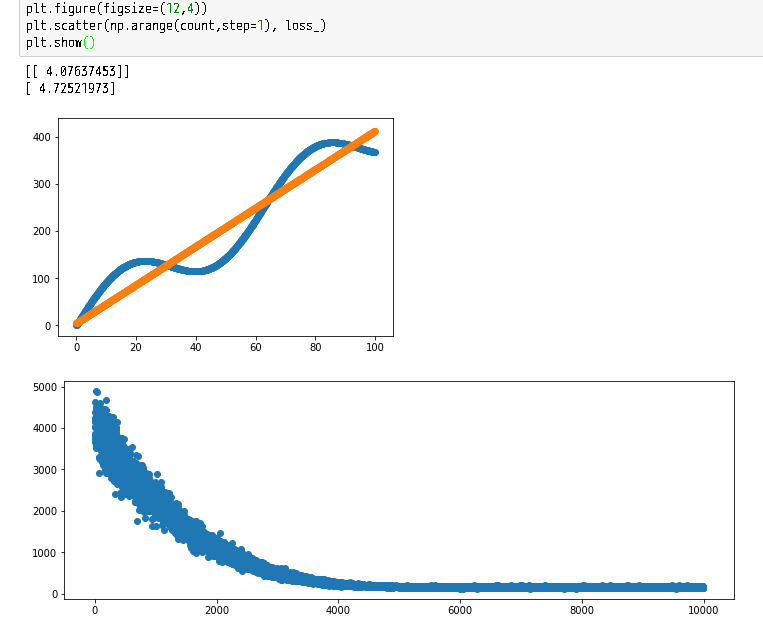
Optimizerは色々な種類が実装されている。
tf.train.AdagradOptimizer()
opt_operation = tf.train.AdagradOptimizer(0.05).minimize(loss)
count = 2000
loss_ = np.zeros(count)
with tf.Session() as sess:
sess.run(tf.global_variables_initializer())
for _ in range(count):
indices = np.random.choice(n_samples, batch_size)
X_batch, Y_batch = X_data[indices], Y_data[indices]
step = _
_, loss_val = sess.run([opt_operation, loss], feed_dict={X:X_batch, Y:Y_batch})
loss_[step] = loss_val
print(sess.run(W))
print(sess.run(b))
plt.scatter(x_data, y_data)
plt.scatter(x_data, x_data*sess.run(W)+sess.run(b))
plt.show()
plt.figure(figsize=(12,4))
plt.scatter(np.arange(count,step=1), loss_)
plt.show()
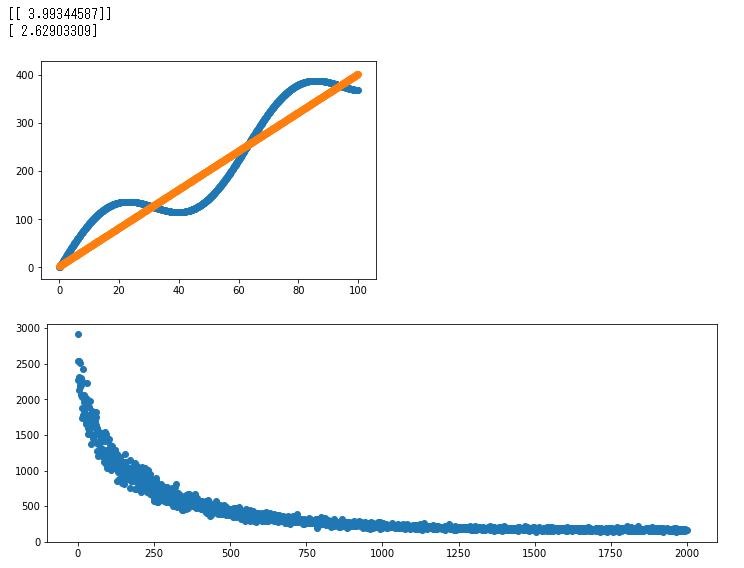
tf.train.GradientDescentOptimizer()
いくつかの最適化ではパラメータが必要である。
opt_operation = tf.train.GradientDescentOptimizer(0.0001).minimize(loss)
count = 500
loss_ = np.zeros(count)
with tf.Session() as sess:
sess.run(tf.global_variables_initializer())
for _ in range(count):
indices = np.random.choice(n_samples, batch_size)
X_batch, Y_batch = X_data[indices], Y_data[indices]
step = _
_, loss_val = sess.run([opt_operation, loss], feed_dict={X:X_batch, Y:Y_batch})
loss_[step] = loss_val
print(sess.run(W))
print(sess.run(b))
plt.scatter(x_data, y_data)
plt.scatter(x_data, x_data*sess.run(W)+sess.run(b))
plt.show()
plt.figure(figsize=(12,4))
plt.scatter(np.arange(count,step=1), loss_)
plt.show()
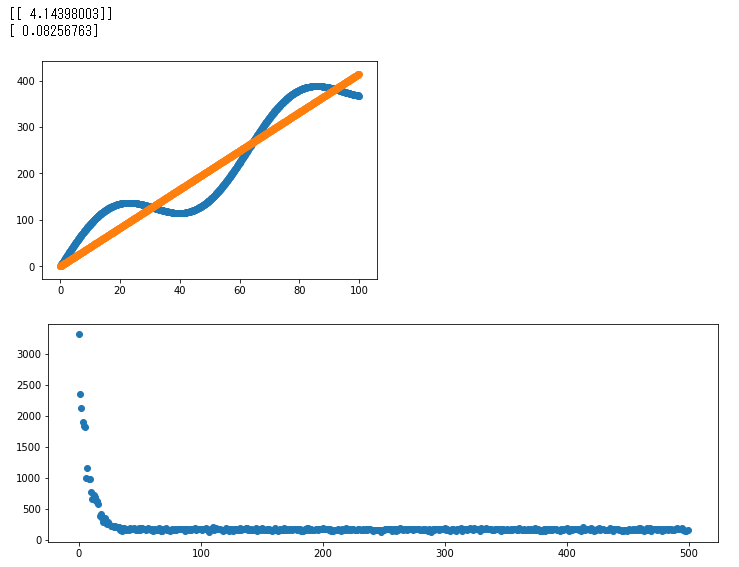
When you read what the founding fathers had to say for themselves, they sound
more like hackers. "The spirit of resistance to government," Jefferson wrote,
"is so valuable on certain occasions, that I wish it always to be kept alive."
Imagine an American president saying that today. Like the remarks of an
outspoken old grandmother, the sayings of the founding fathers have
embarrassed generations of their less confident successors. They remind us
where we come from. They remind us that it is the people who break rules that
are the source of America's wealth and power.
Those in a position to impose rules naturally want them to be obeyed. But be
careful what you ask for. You might get it.
-- Paul Graham
-- The Word "Hacker" ( http://www.paulgraham.com/gba.html )
<simcop2387> Daveman: i use a ZED PEE EM to power my computer, its the
ultimate YOU PEE ES
* Daveman throws an Elisabeth at Simcop
<rindolf> Me catches the Elisabeth in mid-air.
<SubStack> with an s, excellent choice
<Daveman> :o
<Daveman> Interception!
<rindolf> Daveman: when my friend and I played Frisbee, we had an
intra-tree move.
* SubStack pirates Elisabeth and seeds a torrent
<rindolf> Which was unintended.
<rindolf> Elisabeth: are you here?
<Daveman> HAHAHAHHA
<Daveman> Substack++
* SubStack wins at life.
<rindolf> An Elisabeth for all! And all for an Elisabeth.
-- #perl for Elisabeth
-- #perl, Freenode